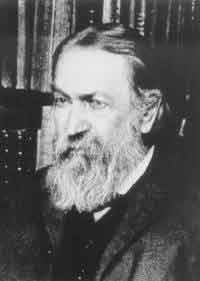Mach, Ernst (1838–1916)

Ernst Mach was an Austrian physicist and philosopher who made significant contributions to the fields of physics, psychology, and epistemology. Born in the Moravian town of Chrlice, Mach received his education in Vienna, where he later became a professor of experimental physics.
Mach's most notable contribution to physics is his work on the study of shock waves. He is credited with the first description of the Mach numbers, which are a measure of the ratio between the speed of an object and the speed of sound in the medium through which it is traveling. Mach's work on shock waves helped to lay the foundation for the development of supersonic flight.
His greatest influence was in philosophy where he rejected from science all concepts that couldn't be validated by experience. His theory of "empirio-criticism" holds that all knowledge is based on sensory experience. He argued that scientific theories are not absolute truths, but rather useful models that allow scientists to make predictions and explain observations. His work influenced the development of behaviorism, which became a dominant school of psychology in the 20th century and helped inform the logical positivism of the Vienna Circle.
Despite his many contributions to science and philosophy, Mach's ideas were controversial in his own time. He was criticized for his rejection of metaphysical concepts and his emphasis on empirical observation. However, his influence can be seen in the work of many later scientists and philosophers, including Albert Einstein and Ludwig Wittgenstein. In particular, Mach's view helped free Einstein from the absoluteness of Newtonian space and time, paving the way toward his theory of relativity
Mach's principle
Mach's principle is a suggestion put forward by Mach in 1893 according to which the inertial effects of mass are not an innate property of a body, but instead are the result of the effect of all the other matter in the universe. In other words, it postulates that the local behavior of matter is influenced by the global properties of the universe. More specifically, Mach's principle claims that it is not absolute acceleration, but the acceleration relative to the center of mass of the universe, which determine the inertial properties of matter. If a body is accelerated with respect to the total mass of the universe, it experiences "forces" such as centrifugal and centripetal force. Mach's principle, however, does not offer an explanation of how the matter in the rest of the universe influences the inertial properties of of the body.
Mach's principle was brought to widespread attention by Einstein, and undoubtedly played some role as Einstein formulated his general theory of relativity. However, the principle is now known to be incompatible with the general theory.


